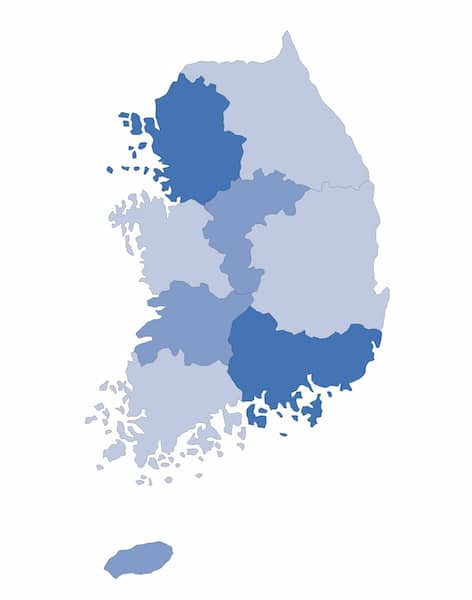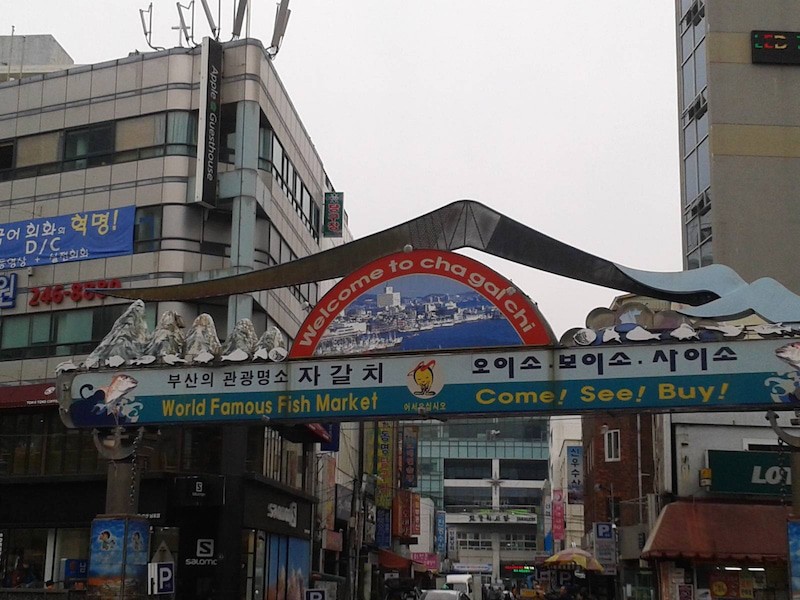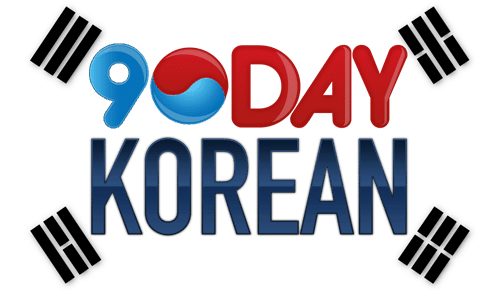All Korean text books teach students how to speak standard Korean, which is the dialect found in Seoul. However, Korea is a mountainous country that until very recently was difficult to travel around. As a result, each region has strong regional dialects, called ‘satoori’ in Korean. The best way to learn satoori is from a native of that province as satoori is generally spoken rather than written. This can make it hard to learn from written sources as it will be written phonetically whilst regular Korean (despite what many people think) is not written perfectly phonetically. This makes it more difficult to make the connections between sounds in satoori and regular Korean through reading alone.

Korea has many regional dialects
Regional Korean satoori (사투리) is very different from regular Korean (표준어). As satoori is often spoken, and used between people who are intimate with each other, most of the examples in this article are written in 반말, so be careful when using them with people who you are not close to or with people who are older than you. This article covers the three main Korean dialects that you are likely to hear: Gyeongsang, Jeolla, and Jeju dialects. Some other dialects that you may come across in South Korea include Chungcheong dialect, Gangwon dialect (which is very similar to Seoul dialect) and perhaps even Chinese Korean (조선적인) Dialect.
Busan / Gyeongsang Dialect

Busan at night
Seoul and Busan could not be more different, they are at opposite ends of the country and to travel between them you have to go through endless mountain ranges. As a result, the dialects in Seoul and Busan are very different, to the extent that people from Seoul and people from Busan can have a hard time understanding each other. The differences between the two dialects are much bigger than the differences between different English dialects in the USA, although British readers could use the difference between the accents and dialects in London and Newcastle as a comparison. The difference could also be thought of as similar to the differences between the Tokyo and Osaka dialects of Japanese, with Busan satoori, like the Osaka dialect, being considered rougher than the dialect of the capital city. Lots of great Korean films are set in Busan, such as 친구, 해운대, and the recent Korean box-office hit 국제시장. Busan is also a great place to visit whilst in Korea so learning a bit of the local dialect, or satoori, could be very useful. Here is an example of Busan Satoori spoken by Robert Holley, who, due to his accent, has appeared on many Korean TV programs such as the popular ‘90’s comedy 남자셋, 여자셋.
오이소, 보이소, 사이소 = 오세요, 보세요, 사세요요

오이소, 보이소, 사이소
Jagalchi fish market is one of Busan’s main attractions for tourists. On the sign welcoming people to this huge market, you will see the words ‘오이소, 보이소, 사이소’, meaning ‘come, see, buy’. In Busan satoori, the imperative form of a verb is made by adding –이소 rather than the standard –세요. For example 가세요 becomes 가이소 in Busan dialect. This feature of the dialect is proudly shown on the sign at Jagalchi Market’s entrance.
밥묵읏나? = 밥먹었어?
The Korean expression ‘밥 먹었어?’ literally translates as ‘Did you eat?’ but its meaning is more like ‘How are you?’. It is sometimes spoken as ‘밥 먹었니?’ which means the same thing. In Busan satoori, to say this expression, you should say ‘밥 묵읏나?’ or just ‘밥 문나’. In Busan satoori, yes/no questions usually end with an ‘아’ sound whereas ‘wh’ word questions such as 머 하노 (뭐 하니 / 뭐 해 in standard Korean) end in an ‘오’ sound (the Seoul dialect makes no distinction between these different question types). The verb 먹다 in Busan satoori is 묵다. The way verbs are used is slightly different in Busan satoori, for example the 받침 (bottom consonant) isn’t always removed in irregular verbs and adjectives such as 낫다 or 덥다.
맞나? = 정말?
Instead of ‘정말?’ / ‘그래요?’, people in Busan usually say ‘맞나?’ There are lots of unique words in the Busan dialect such as ‘찌짐’ which means 전 (as in 파전), ‘단디하다’ (단단히 하다) which means ‘조심하다’, and ‘디질래?’ Which means ‘죽을래?’ You can find a list of Busan dialect words by category here.
Jeolla Dialect
Ever since the days of the three kingdoms, Jeolla and Gyeongsang province have been bitter rivals, and so it comes as no surprise that they have very different accents and dialects. Like Busan satoori, the imperative form is different in Jeolla satoori, with ‘라우’ or ‘지라우’ being used instead of ‘세요’. Also, the vowel sounds are slightly different, ‘어’ becomes ‘으’ and ‘여’ becomes ‘예’, so words like ‘먹다’ or ‘없다’ become ‘믁다’ and ‘읎다’. To ask questions or make suggestions, an ‘잉’ sound sometimes appears, so ‘Have you eaten?’ would be pronounced ‘밥 믁어잉?’ in Jeolla province. The province also has its own unique words such as ‘시방’ which means ‘now’.
Jeju Dialect

혼저옵세예!
Being an island, Jeju’s dialect is even more different than the other Korean dialects. Some of its unique words are related to Mongolian from the time that it was ruled by Mongolia. It even includes a vowel that can’t be found in regular Korean.
To say ‘welcome’, you can say ‘혼저옵세예’, for ‘thank you’, you can say ‘고맙수다’, and for ‘nice to meet you’, you can say ‘반갑수다’ or ‘반갑시오’, although this is also sometimes used to say ‘hello’ on Jeju island. A well-known word in Jeju dialect is ‘하르방’ meaning ‘grandfather’, not to be confused with ‘한라봉’, Jeju’s native tangerines.
Dialects have many hundreds, if not thousands, of unique words and phrases so it isn’t possible to teach you how to speak Busan dialect as well as Robert Holley in just one article. If you are interested in learning more about a particular dialect, then the best way to do that is by actively searching out people from that region for language exchanges.
Which dialect would you most like to learn and why?
 Learn to read Korean and be having simple conversations, taking taxis and ordering in Korean within a week with our FREE Hangeul Hacks series: http://www.90DayKorean.com/learn
Learn to read Korean and be having simple conversations, taking taxis and ordering in Korean within a week with our FREE Hangeul Hacks series: http://www.90DayKorean.com/learn
Korean lessons * Korean Phrases * Korean Vocabulary * Learn Korean * Learn Korean alphabet * Learn Korean fast * Motivation * Study Korean


Recent comments